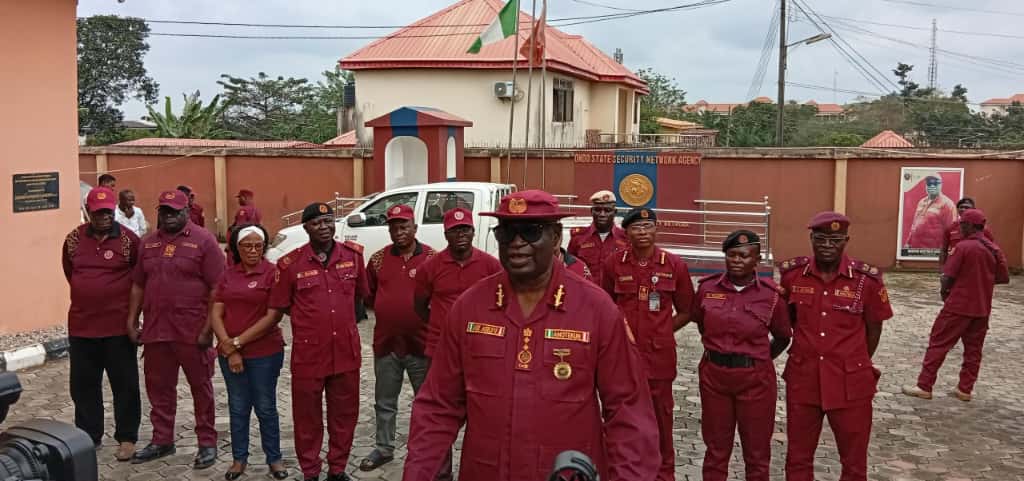
…… Allegations unfounded —Ondo Govt
- ……Advocacy group urges President Tinubu to enforce full financial autonomy
Tensions are rising between Ondo State Governor Lucky Aiyedatiwa and the 18 elected local government chairmen over the control of the council allocations from the Federation Account Allocation Committee (FAAC).
Despite the Supreme Court’s July 2024 ruling granting financial autonomy to local governments, sources reveal that council chairmen in Ondo State still lack full control over their funds.
The federal government has delayed the direct transfer of local government allocations into the accounts of the 774 councils, while continuing to deposit the allocations into their state-local joint accounts.
The Minister of Finance and Coordinating Minister of the Economy, Wale Edun, recently attributed the delay to structural issues.
However, this has left local government administration in Ondo State at its lowest ebb, with chairmen struggling to perform statutory functions due to limited funds.
A council chairman, speaking anonymously due to the issue’s sensitivity, told our reporter, “We are only entitled to a sum of N4 million monthly from the FAAC funds allocated to us, while the substantial part of our funds is controlled by the state governor.”
While, explaining how the fund is distributed, the chairman alleged that “You know we are still operating a joint account for the local government funds, and when the FAAC allocation is released, they will disburse what each local government is entitled to, but we are made to return the substantial part of the funds into the Ministry of Local Government account, while we are left with N4 million.”
The chairman, who did not want to reveal his local government to the public, cited an example with some local government allocation funds. He said, “For instance, in the last FAAC for June, some local governments received N644 million, N590 million and N405 million. You can verify this from the BudgIT website. So, despite this huge allocation, the chairmen are only entitled to N4 million to run the councils.”
Another chairman confirmed the state’s control over funds, stating that “What we learnt was that the reason the state government is still managing our funds is because of some of the local government responsibilities such as primary healthcare, basic education, and the funding of Amotekun, are still currently under the supervision of the state government.”
The chairman who expressed his frustration noted that “Even if the state government controls the fund, we should not be left with N4 million. To do what? It is not even enough to run the local government office. The main reason President Bola Tinubu approached the Supreme Court for local government autonomy was because of his eagerness to take governance to the grassroots.
“Unfortunately, we are lacking funds despite having ideas to make our people feel the impact of President Tinubu’s Renewed Hope Agenda. We have spent six months in the office, and none of us can boast of any developmental project we have executed.”
When asked if they have complained to the governor since they are members of the same political party, the chairman disclosed that “we are making efforts to meet the governor but some of us are foot-dragging because they do not want to be seen as disloyal party chairmen. We are not begging for much, if 20 percent of the money meant for the local government is released to us, you will see changes at the local level”.
Governor Aiyedatiwa recently clarified his stance at a four-day sensitisation training for local government officials in Akure in late July, stating that his administration is not against local government autonomy.
He added that for local government autonomy to be effective, it must be exercised responsibly and in accordance with the legal framework established by the constitution and relevant laws.”
CSO REACTION
Meanwhile, the Association for Good Governance Advocacy (AGGA) has urged President Bola Tinubu to urgently implement full financial autonomy for local governments nationwide.
In a statement issued on Friday, and signed by its Coordinator, Mrs. Folakemi Benson, AGGA said apart from Lagos State, where council chairmen enjoy full autonomy over their funds, no other state in the federation allows local governments total control of the allocations accruing to them from the federation accounts.
AGGA stressed that this lack of independence has stifled development, leaving grassroots communities disconnected from national policies.
The group stated “We are compelled to ask the federal government why it is still delaying the direct payment of local government funds into their respective accounts. The Supreme Court’s landmark ruling in July 2024 affirmed this autonomy, yet one year later, implementation remains stalled in most states, allowing governors to continue mismanaging the funds.”
AGGA statement reads “Local governments are meant to be the closest tier of governance to the people, delivering essential services like roads, healthcare, education, and sanitation. However, without financial autonomy, they remain crippled, unable to function as intended.”
The group called on President Tinubu to enforce direct allocations to local governments, bypassing state interference, to empower chairmen to deliver on their mandates and revive grassroots governance.
ALLEGATION UNTRUE – ONDO GOVT
The Ondo State Commissioner Local government and Chieftaincy affairs, Amidu Takuro has dismissed allegations that local government chairmen are being compelled to divert their monthly allocations to the Ministry.
Reacting to the claims, the Commissioner said, “That is not true. Maybe they can come out openly to speak, because there is no secrecy in this system. What the government has been doing for them is a unanimous decision. It is not something enforced on anybody. It is an open system, an open-door policy. The money is in their accounts, and anybody can come and check. Whatever we are implementing is through their budget provision.”
On the alleged directive that councils retain only ₦4 million monthly, he stated: “That is not true. That is not true. That is not true. I will check my record, but that claim is unfounded.”
He explained that deductions from council allocations are statutory: “are they not going to pay the salary of their workers? Is it not still government paying on their behalf? We have the Local Government Service Commission, we have SUBEB, we have the Pension Board, training schools, loans board. All these are deducted from their own percentage of the money. Teachers’ salaries are deducted, workers’ salaries are deducted, and pensioners too.”
Highlighting the government’s efforts to clear long-standing arrears, he said: “Since 2010, pensioners in Ondo State have not been paid. But since we came on board, we started from 2010 and we have cleared gratuities up to 2013. I want to tell you, it is over ₦3.7 to ₦3.8 billion. If we abandoned those retirees without any arrangement, would they have been paid?”
The Commissioner insisted that the allegations were politically motivated: “If anybody is not in agreement, they should come up openly. We are all under the same political party, under the leadership of somebody. I doubt if any of them can truly say that.”
Reaffirming the state government’s vision, he concluded: “Our vision is to make sure there is an effective and efficient local government administration in Ondo State, where others can even come and emulate. We are mindful that local governments are the closest to the people, and whatever we can do to make them responsible and responsive to their people, we will do.”










